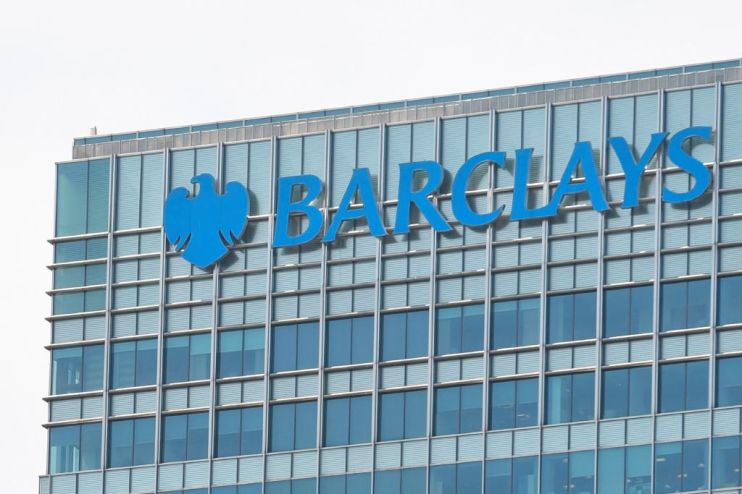Barclays’ first quarter profit falls by £600m amid coronavirus disruption

Barclays’ profit has tumbled to £923m in the first quarter, down from £1.54bn in the same period last year, due to the coronavirus pandemic. it revealed today.
The bank also booked an impairment charge of £2.1bn, which it said reflected its “initial estimates of the impact of the pandemic”.
However, Barclays’ shares jumped five per cent in early trading to 102.7p as its under-fire investment banking division posted a 30 per cent jump in profit.
The figures
Barclays said that its return on tangible investment of 5.1 per cent remained “resilient” despite the situation, reflecting its diversified business model.
Profit before tax almost halved, plunging 40 per cent from £1.54bn in the first quarter of 2019 to £923m between January and March.
And attributable profit fell 44 per cent year-on-year, from £1.08bn to £600m in the first three months of 2020.
Barclays’ UK profit before tax fell to £200m from £600m over the first quarter, while international profit slipped to £800m from £1.1bn.
The bank recorded a return on tangible equity (RoTE) of 5.1 per cent, which it called “resilient” given the coronavirus-struck backdrop to its results.
And its CET1 ratio – a core measure of financial strength – dipped to 13.1 per cent, down 0.7 per cent from the end of 2019.
Earnings per share fell back to 3.5p from 6.1p last year.
Barclays has scrapped its 2020 dividend, in line with other UK banks.
Why it’s interesting
Barclays said that its huge increase in impairment charges was down to £405m in loan charges and a forecast £1.2bn hit from the coronavirus pandemic.
The impairment is roughly in line with HSBC’s own predictions for how badly coronavirus will hit it.
This new baseline forecast includes £300m to cover ongoing instability in the world’s oil prices.
The firm has already cancelled its dividend for 2020, and said it would decide on future dividends policy at the year end.
The bank said it had taken significant steps already to support the government’s efforts in backing struggling British companies through the crisis.
As of the end of last week, Barclays said that it had paid out £737m in loans for the coronavirus business interruption scheme. By then it had approved 238,000 mortgage and loan payment holidays.
John Moore, senior investment manager at Brewin Dolphin, said: “Although Barclays’ results missed some analysts’ expectations, they were resilient against a very tough economic backdrop.
“The banking sector as a whole has been among the worst affected in share price terms over the past few months and Barclays, in particular, trades meaningfully below book value.
“While many worry about Barclays’ credit card exposure, this is part of a broader offering and it was notable that the much-criticised Markets division saw a 106 per cent increase in income.
“Such diversity, added to its present capital base, is an important factor as Barclays deals with the next year or so.”
Barclays investment bankers benefit from volatility
However, its investment banking division benefited from market volatility to report a huge 31 per cent profit jump to £1.2bn in the first quarter.
“Extreme volatility in markets led to a surge in activity and another good month is expected for April,” Graham Spooner, an investment research analyst at The Share Centre, said. He suggested this could help shareholders when Barclays looks again at whether to cut its dividend later this year.
Nicholas Hyett, equity analyst at Hargreaves Lansdown, added: “Volatile financial markets are generally good for banks’ trading businesses, and Barclays has been no exception. That’s provided a useful boost to profits just as allowances for bad loans increase – helping to keep profits and capital on a fairly even keel.
But he warned a sudden spike in corporate lending from the coronavirus volatility has hurt Barclays’ capital ratio.
“Banks are required to hold a certain amount of capital for every loan they make and the sudden increase in lending means capital requirements have increased too,” Hyett explained.
“Despite growing it’s total capital available this quarter Barclays’ capital ratios have actually declined because of the increased lending, an interesting illustration of the dilemmas facing the banking sector.
“The government’s decision to underwrite large portions of coronavirus loans should help to keep the cash flowing out the door to companies, but it’s something to keep an eye on.”
What Barclays said
Chief executive Jes Staley said:
Barclays is committed to supporting its customers, clients and the UK economy through the crisis.
Despite the macroeconomic downturn caused by the COVID-19 pandemic, the Group’s position remains robust, reflecting our diversified business model.
An event like the Covid-19 pandemic makes everyone focus on what’s really important right now. For us, that means running the bank safely and soundly, helping our customers and clients through the difficulties they face, supporting the UK economy and the communities where we live and work, and taking care of our colleagues around the world.